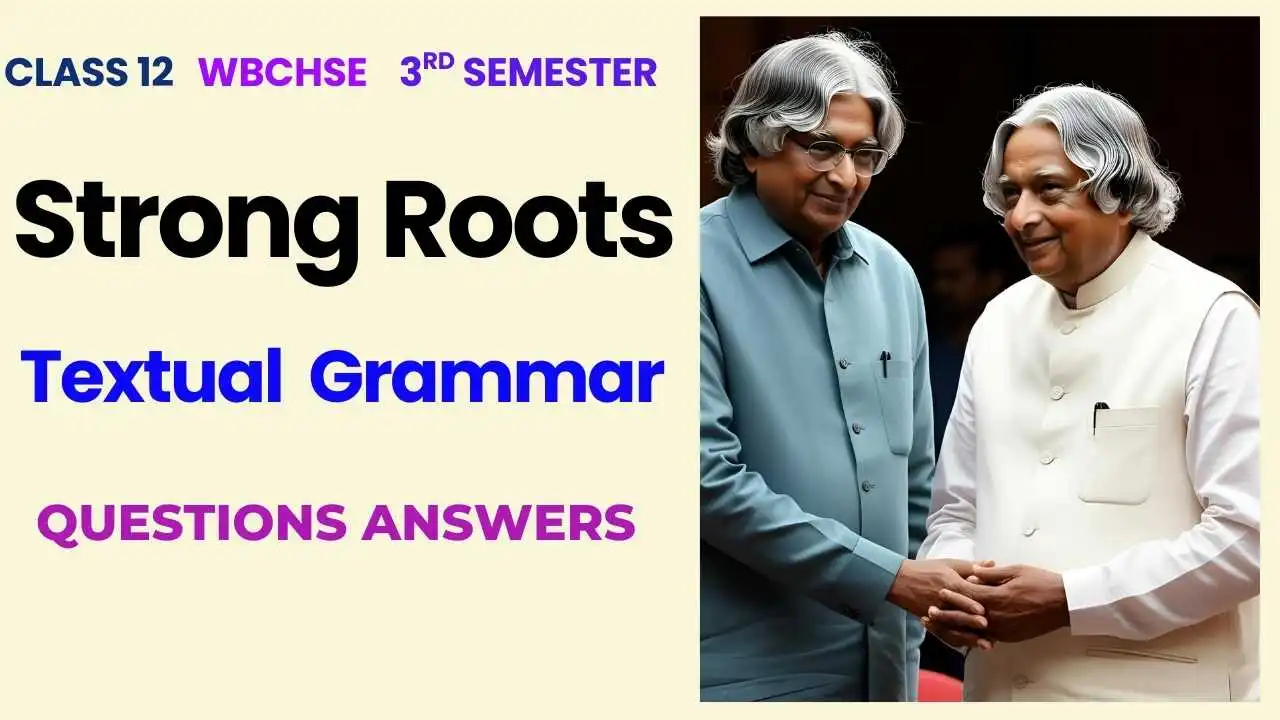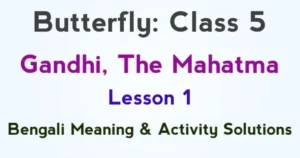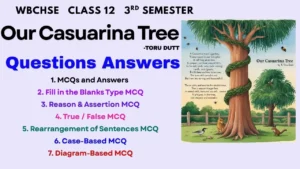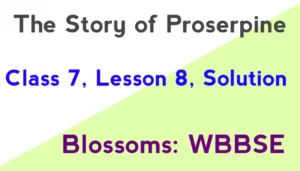Explore Strong Roots Textual Grammar Questions Answers Class 12 for WBCHSE 3rd Semester students. This set includes narration, transformation, joining, error correction, and parts of speech-based grammar exercises. Master grammar with well-structured answers based strictly on the original text.
Strong Roots Textual Grammar Set 1:
Do as Directed
1. “I was born into a middle-class Tamil family,” said Kalam. (Change the narration)
a. Kalam said that he is born into a middle-class Tamil family.
b. Kalam said that he had born into a middle-class Tamil family.
c. Kalam said that he was born into a middle-class Tamil family.
d. Kalam says that he was born into a middle-class Tamil family.
Correct Answer: c
2. My father had neither much formal education nor much wealth. (Identify and correct the error)
a. Replace “neither” with “either”
b. Replace “nor” with “or”
c. No error
d. Replace “much” with “many”
Correct Answer: c
Download Class 12 English (B) Suggestions 3rd Semester PDF 2025
The Suggestive Notes cover a variety of MCQ questions and answers from prose, poetry, drama (Riders to the Sea), and textual grammar. With 25 Sample Question Paper Sets with Answers added. Get your complete PDF copy in one place now and start studying with confidence!
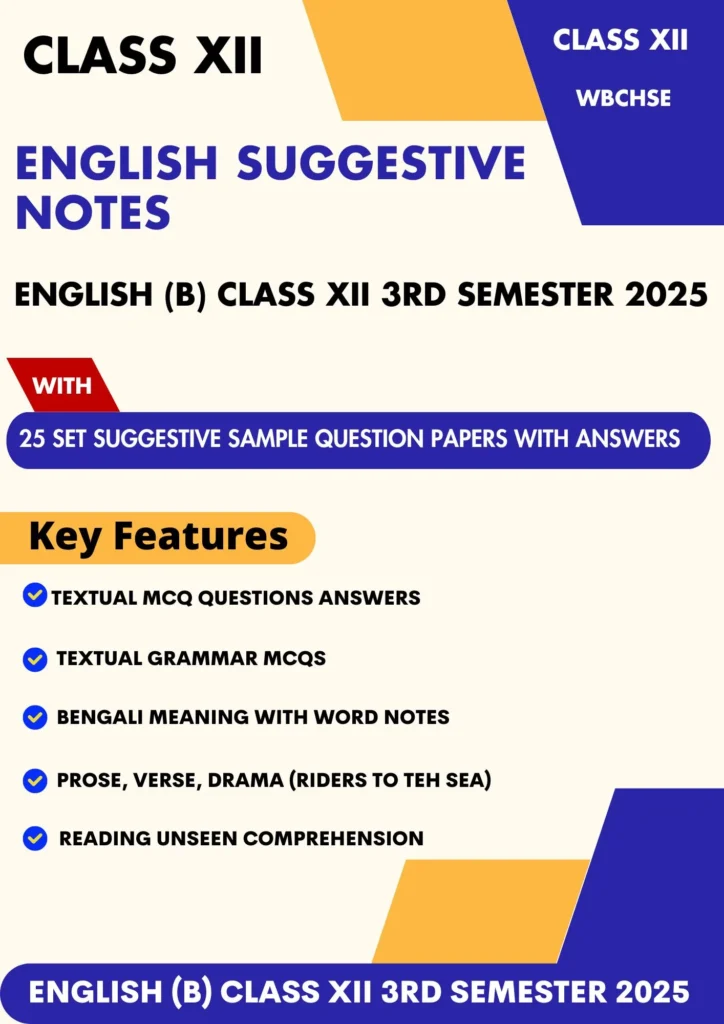
3. He possessed great wisdom. He was not rich. (Join using a suitable clause)
a. He possessed great wisdom although he was not rich.
b. He possessed great wisdom because he was not rich.
c. He was not rich so he possessed great wisdom.
d. He possessed great wisdom and he was not rich.
Correct Answer: a
4. My father dipped his fingers in the water. He said a prayer. (Split into simple sentences)
a. My father dipped his fingers and said a prayer.
b. The prayer was said by my father.
c. My father dipped his fingers in the water. He said a prayer.
d. My father dipped his fingers to say a prayer.
Correct Answer: c
5. The Shiva temple made Rameswaram so famous. (Correct the grammatical error if any)
a. Replace “so” with “very”
b. Use “that” after “so”
c. No error
d. Change “famous” to “popularity”
Correct Answer: c
6. My father started his day at 4 a.m., _____ reading the namaz. (Fill in the blank with correct preposition)
a. by
b. at
c. in
d. with
Correct Answer: a
7. He had neither much education nor much wealth. (Make it affirmative)
a. He had some education and some wealth.
b. He had little education and wealth.
c. He lacked both education and wealth.
d. He was educated and wealthy.
Correct Answer: c
8. He spoke with wisdom. (Rewrite using the adverb form of the underlined word)
a. He spoke wisely.
b. He spoke wise.
c. He had wisdom in speech.
d. He was full of wise.
Correct Answer: a
Strong Roots Textual Grammar Set 2:
Do as Directed
1. My father said, “You must understand the meaning of prayer.” (Change into indirect speech)
a. My father said that I must understand the meaning of prayer.
b. My father said that I had to understand the meaning of prayer.
c. My father said that I must understood the meaning of prayer.
d. My father said that I have to understand the meaning of prayer.
Answer: b
2. He walked four miles to the coconut grove everyday. (Correct the error)
a. Add “in” before “everyday”
b. Replace “everyday” with “every day”
c. Replace “grove” with “groves”
d. No error
Answer: b
3. He returned. Then he had breakfast. (Join into a complex sentence)
a. After he returned, he had breakfast.
b. He returned and had breakfast.
c. He had breakfast when he returned.
d. He had breakfast so he returned.
Answer: a
4. The temple was near our house. It made the town famous. (Split into simple sentences)
a. The temple made the town famous near our house.
b. The temple was near. It made the town famous.
c. The temple was near our house. It was famous.
d. The temple was near our house. The town was famous for it.
Answer: d
5. The priest was my father’s close friend. (Correct the grammatical error if any)
a. No error
b. Replace “was” with “is”
c. Use “more close”
d. Replace “priest” with “priests”
Answer: a
6. My father avoided all inessential comforts and luxuries. (Fill in the blank)
a. necessary
b. required
c. trivial
d. minimum
Answer: c
7. My father had great innate wisdom. (Make it negative)
a. My father did not lack innate wisdom.
b. My father had no wisdom.
c. My father was not wise.
d. My father did not have any wisdom.
Answer: a
8. He showed generosity to the poor. (Rewrite using the adjective form of “generosity”)
a. He was generous to the poor.
b. He had a generous.
c. He acted generosity.
d. He was generously.
Answer: a
Strong Roots Textual Grammar Set 3:
Do as Directed
1. My mother said, “I have cooked rice and chutney.” (Change into indirect speech)
a. My mother said that she had cooked rice and chutney.
b. My mother said that she cooked rice and chutney.
c. My mother said she has cooked rice and chutney.
d. My mother said she was cooking rice and chutney.
Correct Answer: a
2. The house was built in the middle of 19th century. (Correct the error)
a. Add “the” before “middle”
b. Add “the” before “19th century”
c. Replace “in” with “on”
d. Replace “built” with “make”
Correct Answer: b
3. He prayed every morning. He prayed every evening. (Join using conjunction)
a. He prayed every morning but every evening.
b. He prayed every morning and every evening.
c. He prayed while every evening.
d. He prayed both every morning nor evening.
Correct Answer: b
4. He explained the meaning of prayer. He told it in simple Tamil. (Split into two simple sentences)
a. He told it in Tamil. It was simple.
b. He told it in Tamil and explained.
c. He explained the meaning of prayer. He used simple Tamil.
d. Tamil was used by him. He explained it.
Correct Answer: c
5. The boy had undistinguished looks. (Correct the grammatical error)
a. undistinguished → indistinguishable
b. had → has
c. No error
d. boy → child
Correct Answer: c
6. She ladled rice and chutney on a banana _____ . (Fill in the blank)
a. paper
b. skin
c. table
d. leaf
Correct Answer: d
7. He avoided no comforts. (Change into affirmative)
a. He avoided every comfort.
b. He did not avoid comforts.
c. He accepted all comforts.
d. He avoided all comforts.
Correct Answer: d
8. He showed great wisdom. (Rewrite using the adjective form of underlined word)
a. He was wisdomful.
b. He was wise.
c. He acted with wisdom.
d. He had a wise.
Correct Answer: b
Strong Roots Textual Grammar Set 4:
Do as Directed
1. Father said, “You should pray regularly.” (Change into indirect speech)
a. Father said that I shall pray regularly.
b. Father said that I should pray regularly.
c. Father said that I prayed regularly.
d. Father said I am praying regularly.
Correct Answer: b
2. We lived in ancestral house. (Correct the grammatical error)
a. Add “the” before “ancestral”
b. Change “lived” to “live”
c. Replace “in” with “at”
d. Change “ancestral” to “ancestor”
Correct Answer: a
3. He went to the mosque. He said his prayers. (Join using an adverbial clause)
a. He went to the mosque although he said his prayers.
b. He said his prayers while he went to the mosque.
c. He went to the mosque where he said his prayers.
d. He went to the mosque before he said his prayers.
Correct Answer: c
4. My father explained the meaning of prayer in simple Tamil. (Split into two simple sentences)
a. My father knew Tamil. He explained prayer.
b. He explained something. It was simple Tamil.
c. My father explained something. It was the meaning of prayer.
d. My father explained prayer. He used simple Tamil.
Correct Answer: d
5. They were waiting for him outside the mosque. (Correct the grammatical error)
a. Remove “for”
b. Change “were” to “was”
c. Replace “waiting” with “waited”
d. Add “the” before “outside”
Correct Answer: b
6. He walked down to the coconut _____ every morning. (Fill in the blank)
a. land
b. tree
c. garden
d. grove
Correct Answer: d
7. How generous he was! (Make it assertive sentence)
a. He was how generous.
b. He was a generous man.
c. He was very generous.
d. It was he who was generous.
Correct Answer: c
8. He decided to act wisely. (Rewrite using the noun form of underlined word)
a. He took a decision to act wisely.
b. He made a wise act.
c. He used his decision wisely.
d. He showed wise decide.
Correct Answer: a
Strong Roots Textual Grammar Set 5:
Do as Directed
1. He said, “Prayer connects the spirit.” (Change into indirect speech)
a. He said that prayer is connecting the spirit.
b. He said that prayer has connected the spirit.
c. He said that prayer connected the spirit.
d. He said that prayer connects the spirit.
Correct Answer: d
2. She take care of the poor. (Correct the grammatical error)
a. Change “take” to “takes”
b. Replace “care” with “caring”
c. Add “a” before “care”
d. Remove “of”
Correct Answer: a
3. He dipped his fingers. He said a prayer. (Join using an adverbial clause)
a. He dipped his fingers before he said a prayer.
b. He dipped his fingers but said a prayer.
c. He dipped his fingers though he said a prayer.
d. He said a prayer because he dipped his fingers.
Correct Answer: a
4. He was convinced about prayer. He believed in its power. (Split into two sentences)
a. He believed something. Prayer was it.
b. He was convinced. He believed in its power.
c. Prayer was powerful. He thought so.
d. He believed in power. It was prayer.
Correct Answer: b
5. The temple was near from our house. (Correct the grammatical error)
a. Remove “from”
b. Replace “near” with “nearly”
c. Add “to” after “near”
d. Change “our” to “ours”
Correct Answer: a
6. They waited for father with _____ bowls of water. (Fill in the blank)
a. big
b. filled
c. empty
d. clay
Correct Answer: c
7. He always respected others. (Make it Negative)
a. He never disrespected others.
b. He didn’t respect others sometimes.
c. He was not respectful.
d. He did not show much respect.
Correct Answer: a
8. He answered in a low, deep voice. His answer filled me with energy. (Rewrite using the adjective form of the underlined word)
a. His energetic words inspired me.
b. He was energised in speech.
c. He answered energically.
d. He had energic faith.
Correct Answer: a
Strong Roots Textual Grammar Set 6:
Do as Directed
1. I asked, “Why don’t you say this to the people?” (Change into indirect speech)
a. I asked why didn’t he say this to the people.
b. I asked why he does not say this to the people.
c. I asked why he should not say this to the people.
d. I asked why he didn’t say that to the people.
Correct Answer: d
2. They comes to him for help. (Correct the grammatical error)
a. Change “comes” to “come”
b. Replace “to” with “for”
c. Add “are” before “comes”
d. Change “help” to “helps”
Correct Answer: a
3. The prayer ended. The people offered water. (Join using a noun clause)
a. When the prayer ended, people offered water.
b. That the prayer ended was when people offered water.
c. People offered water after the prayer ended.
d. The people offered water because the prayer ended.
Correct Answer: a
4. My mother fed many outsiders. She cooked every meal herself. (Split into two sentences)
a. My mother fed people. Meals were cooked.
b. She cooked food. She gave it to outsiders.
c. My mother fed many outsiders. She did all the cooking.
d. My mother cooked. Outsiders ate.
Correct Answer: c
5. He was respected by all in the locality. (Correct the grammatical error)
a. Remove “by”
b. Change “was” to “is”
c. Replace “in” with “from”
d. Replace “respected” with “respectful”
Correct Answer: b
6. He spoke to me in a _____ voice. (Fill in the blank)
a. loudly
b. high
c. soft
d. slow
Correct Answer: c
7. He avoided all luxuries to lead a simple life. (Make it Complex)
a. He avoided all luxuries because he wanted to lead a simple life.
b. He avoided luxuries and led a simple life.
c. He led a simple life by avoiding all luxuries.
d. All luxuries were avoided for a simple life.
Correct Answer: a
8. The Shiva temple, which made Rameswaram so famous to pilgrims… (Rewrite using the noun form of the underlined word)
a. The fame of the temple attracted pilgrims.
b. Its famousity drew attention.
c. The faming of Rameswaram began here.
d. Pilgrims knew it for its famously.
Correct Answer: a
Strong Roots Textual Grammar Set 7:
Do as Directed
1. Father said, “Adversity gives us a chance to reflect.” (Change into indirect speech)
a. Father said adversity gave us a chance to reflect.
b. Father said that adversity gives us a chance to reflect.
c. Father said adversity has given us a chance to reflect.
d. Father said that adversity gave them chance to reflect.
Correct Answer: b
2. He go to the mosque every evening. (Correct the grammatical error)
a. Change “go” to “goes”
b. Change “evening” to “evenings”
c. Replace “to” with “into”
d. Add “the” before “every”
Correct Answer: a
3. They sat outside. They waited for blessings. (Join using an adjective clause)
a. They sat outside so that they waited for blessings.
b. They sat outside who waited for blessings.
c. They, who waited for blessings, sat outside.
d. They sat outside where they waited for blessings.
Correct Answer: c
4. She placed a banana leaf. She ladled rice on it. (Split into two simple sentences)
a. She placed a banana leaf. She served rice on it.
b. A leaf was there. Rice was put.
c. She had a banana leaf. Ladling rice was her job.
d. She ladled. Then she placed a leaf.
Correct Answer: a
5. We lived in our ancestral house built in 19th century. (Correct the grammatical error)
a. Add “the” before “19th century”
b. Change “house” to “home”
c. Replace “built” with “build”
d. Add “on” before “19th century”
Correct Answer: a
6. He always speaks in a _____ manner. (Fill in the blank)
a. spiritual
b. spirit
c. spiritually
d. spirituality
Correct Answer: a
7. What a peaceful life he lived! (Make it Assertive sentence)
a. He lived such a peaceful life.
b. He lived a very peaceful life.
c. His life was not full of peace.
d. He had peace in his
Correct Answer: b
8. He failed many times. (Rewrite using the noun form of the underlined word)
a. He made a failure many times.
b. He is failing always.
c. His many times were failed.
d. His failure made him
Correct Answer: a
Strong Roots Textual Grammar Set 8:
Do as Directed
1. He said, “Prayer connects us to the cosmos.” (Change into indirect speech)
a. He said prayer connects us to the cosmos.
b. He said that prayer connected them to the cosmos.
c. He said that prayer connects them with cosmos.
d. He said that the prayer connect us to the cosmos.
Correct Answer: b
2. He walks four miles to the coconut grove every morning. (Correct the grammatical error)
a. Add “for” before “four”
b. Add “about” before “four miles”
c. Replace “to” with “into”
d. Change “walks” to “walk”
Correct Answer: b
3. I ate with my mother. We sat in the kitchen. (Join using an adverbial clause)
a. When we sat in the kitchen, I ate with my mother.
b. I ate with my mother, who sat in the kitchen.
c. I ate with my mother and sat.
d. My mother sat in the kitchen while I ate.
Correct Answer: a
4. They discussed spiritual matters every evening. It became a habit. (Split into two sentences)
a. They did something spiritual. It was a habit.
b. Spiritual discussions became a habit.
c. They discussed spiritual matters. That became a habit.
d. They were in a habit. They spoke every day.
Correct Answer: c
5. My father started his day at 4 am. (Correct the grammatical error)
a. Change “at” to “on”
b. Add “every” before “4 am”
c. Add “the” before “day”
d. No error to correct here – change not needed
Correct Answer: c
6. He returned _____ about a dozen coconuts. (Fill in the blank with an appropriate preposition)
a. with
b. by
c. of
d. on
Correct Answer: a
7. He had not the faintest idea of the meaning. (Transform into Affirmative Sentence)
a. He did not know the meaning.
b. He had absolutely no idea.
c. He was completely unaware of the meaning.
d. He was totally ignorant of the meaning.
Correct Answer: c
8. She showed true generosity. (Rewrite using Noun form of underlined word)
a. She was generously helping.
b. She was a generous person.
c. She generosity showed truth.
d. She showed a
Correct Answer: b
Strong Roots Textual Grammar Set 9:
Do as Directed
1. He said, “Every human is part of the divine.” (Change into indirect speech)
a. He said every human is part of the divine.
b. He said that every human had been part of the divine.
c. He said that every human was a part of the divine.
d. He said every human were part of the divine.
Correct Answer: c
2. He dipped his fingers into the water and prays. (Correct the grammatical error)
a. Change “dipped” to “dip”
b. Change “prays” to “prayed”
c. Replace “fingers” with “finger”
d. Remove “into”
Correct Answer: b
3. They reached the mosque. They offered prayers. (Join using a noun clause)
a. They offered prayers where they reached the mosque.
b. That they reached the mosque made them pray.
c. What they did after reaching the mosque was offer prayers.
d. Because they reached the mosque, they offered prayers.
Correct Answer: c
4. He had neither wealth nor formal education. (Split into two simple sentences)
a. He lacked both wealth and education.
b. He had no wealth. He also had no formal education.
c. He had neither education. He had wealth.
d. He was poor. He read less.
Correct Answer: b
5. He avoided all inessential comforts and luxuries. (Correct the grammatical error)
a. Add “the” before “inessential”
b. Change “comforts” to “comfort”
c. Replace “and” with “or”
d. No grammatical correction needed
Correct Answer: a
6. People sat _____ the mosque, waiting for him. (Fill in the blank with appropriate preposition)
a. inside
b. beyond
c. beside
d. outside
Correct Answer: d
7. Avoiding luxuries, he lived a simple life. (Make it complex sentence)
a. Though he avoided luxuries, he lived a simple life.
b. He lived a simple life by avoiding luxuries.
c. Since he avoided luxuries, he lived simply.
d. As he avoided luxuries, he lived a simple life.
Correct Answer: d
8. Prayer made possible a communion of the spirit between people. (Rewrite using the verb form of the underlined word)
a. People could commune with one another in spirit.
b. They were deeply communioning through prayers.
c. They had a communional connection.
d. They always communioned at prayers.
Correct Answer: a
Strong Roots Textual Grammar Set 10:
Do as Directed
1. I said to my father, “Why don’t you say this to others?” (Change into indirect speech)
a. I told my father why he didn’t say that to others.
b. I asked my father why he didn’t say this to others.
c. I asked my father why he did not say that to others.
d. I said to my father why he did not told this to others.
Correct Answer: c
2. She feed more people than the family members. (Correct the grammatical error)
a. Change “feed” to “fed”
b. Add “did” before “feed”
c. Replace “than” with “then”
d. Remove “more”
Correct Answer: a
3. The temple stood tall. Pilgrims visited it daily. (Join using an adjective clause)
a. The temple, which pilgrims visited daily, stood tall.
b. The temple was visited daily, and stood tall.
c. The temple stood tall when pilgrims visited it.
d. Pilgrims visited the tall-standing temple.
Correct Answer: a
4. The house was made of limestone and brick. It was large. (Split into two simple sentences)
a. It was a large house. It was made of lime and brick.
b. The house was large. It was made of limestone and brick.
c. The house made of brick. It was large.
d. It made a house. It was large and built.
Correct Answer: b
5. He prayed at dawn regularly. (Correct the grammatical error)
a. Add “the” before “dawn”
b. Change “prayed” to “prays”
c. Remove “regularly”
d. Change “at” to “on”
Correct Answer: a
6. He walked _____ the coconut grove every morning. (Fill in the blank with appropriate preposition)
a. by
b. towards
c. into
d. to
Correct Answer: d
7. He was always hopeful during adversity. (Make it Negative Sentence)
a. He was not hopeless during adversity.
b. He was never in despair during adversity.
c. He did not lose hope during adversity.
d. He wasn’t ever worried during adversity.
Correct Answer: c
8. My father told me there was nothing mysterious about prayer. (Rewrite using the noun form of the underlined word)
a. He said there was no mystery in prayers.
b. He removed all mystering doubts.
c. He explained the mysteriosity behind prayer.
d. It was a talk without mystericness.
Correct Answer: a
Strong Roots Textual Grammar Set 11:
Do as Directed
1. He said to me, “You must understand the meaning of prayer.” (Change into indirect speech)
a. He said to me that I must understand the meaning of prayer.
b. He told me that I must understand the meaning of prayer.
c. He told me that I had to understand the meaning of prayer.
d. He told me I must be understanding the meaning of prayer.
Correct Answer: c
2. He avoid all inessential comforts and luxuries. (Correct the grammatical error)
a. Change “avoid” to “avoided”
b. Add “was” before “avoid”
c. Replace “comforts” with “comfort”
d. Change “luxuries” to “luxury”
Correct Answer: a
3. There was an old mosque. My father took me there for prayer. (Join using an adjective clause)
a. My father took me to a mosque which was very old.
b. My father took me to an old mosque for prayer.
c. There was a mosque, and he took me for prayer.
d. The mosque was old where my father took me.
Correct Answer: a
4. He read the namaz. Then he walked to the coconut grove. (Split into two simple sentences)
a. He walked to the coconut grove. Then he read the namaz.
b. He walked after reading the namaz.
c. He read the namaz. He then walked to the coconut grove.
d. He walked to the coconut grove after namaz.
Correct Answer: c
5. They offered water to my father for blessings. (Correct the grammatical error)
a. Add “the” before “blessings”
b. Change “offered” to “offering”
c. Change “to” into “from”
d. Replace “for” with “with”
Correct Answer: a
6. He dipped his fingertips ______ the water. (Fill in the blank with appropriate preposition)
a. on
b. in
c. over
d. into
Correct Answer: b
7. What a secure childhood I had! (Turn into Assertive sentence)
a. I had a childhood full of joy.
b. I had a very secure childhood.
c. My childhood was secure.
d. I was happy in my childhood.
Correct Answer: b
8. He prayed regularly with great devotion. (Rewrite using the verb form of the underlined word)
a. He showed how he devoted himself regularly to prayers.
b. His devotee attitude was clear from his prayers.
c. He was devotedly regular in praying.
d. His devotion to prayers was evident from his regularity.
Correct Answer: d

